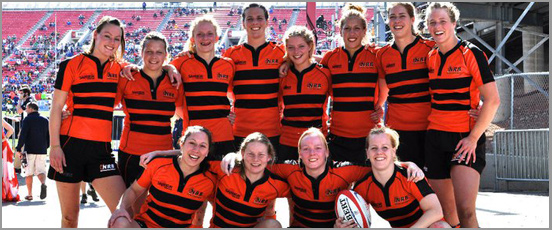Netherlands: The end of a dream
Eight years ago one small rugby nation made history, took on the rest of the rugby world and came close to achieving a dream. Today the dream came to an end.
Published by John Birch, May 11th, 2019
6 minute read

May 2011. Women’s sevens is to feature in the 2016 Olympics will include sevens, and a women’s sevens world series is being planned. It’s a whole new world – and one country reacts faster than them all to set up the world’s first professional women’s rugby programme, with Rio the target.
One forward-looking national union had stolen a march on the rest of the world, reached an funding agreement with their Olympic Association, put together an innovative talent identification programme. And that was… the Netherlands.
It was a surprise, but perhaps should not have been. The Dutch had a great women’s rugby pedigree. They been playing international rugby longer than anyone (literally – they and France and played in the first ever test match), if there had been any test world ranking they would have been comfortably in top 10, and when it came to sevens they had finished runners-up to Spain in the previous year’s European Championship and had finished runners-up in Las Vegas and for third in Hong Kong in weeks before the announcement.
But the Dutch were not going to stick to their existing rugby community. They were starting with a blank sheet, and made an appeal to any Dutch athletes to attend a series of nationwide talent trials. They initially targeted football, athletics and judo, but in practice anyone with the right skills would be fast-tracked into sevens rugby. It’s an idea that hardly seems new today, but the Dutch talent programme was the first.
Soon a squad came together with names who would become familiar, including Linda Franssen, Inge Visser, Annemarije Van Rossum, Lorraine Laros, Pien Selbeck, Kelly van Harskamp and Tessa Veldhuis.
As a trial for a World Series, the IRB organised a three tournament “IRB Challenge” series. The Dutch were not invited to the first round in Dubai at the end of 2011, and finished disappointing 10th after being narrowly defeated by Australia in Hong Kong, but in the final round in London it all came together as the Dutch topped their pool (above Russia and Canada), saw off France in the quarter finals and then Australia in the semi-finals before finally losing to England in the final. The semi-final in particular was a stand-out performance, showing what the Dutch were capable of as Linda Laros’ boot put them ahead before Dutch tactical ability and teamwork ensured that Australia could not get a touch of the ball.
It was a performance that ensured the Netherlands would be one of six core teams in the first World Series. With qualification for Rio three years away the Dutch project was on target – but in retrospect perhaps that London semi-final would be the highpoint.
The Dutch finished 7thin the first World Series – which, in any other year, would have been enough to qualify for the following year, but the IRB decided that qualification for the second series would be decided by the 2013 World Cup. The quarter-finalists would be the eight core teams, and the Dutch were drawn in the toughest pool with New Zealand and Canada – and missed out.
Outside the World Series any advantage the Dutch may have had was quickly lost. The 2014-15 series would be the Olympic qualifier – which meant the Dutch had to win a place at the qualifier in Hong Kong in September 2014, but they lost in the quarter-finals to South Africa.
The June 2015 European Championship was their next hope, but another year outside the World Series and the Dutch lost in the quarter-finals to Spain. The last chance was the Repecharge. To make that the Dutch needed to finish third on a qualifier tournament in Lisbon, but they lost in the third place playoff to Portugal – who they had never lost to before. The Rio dream as over.
Funding was cut, most of the leading players retired and in 2017 the Dutch slipped to the second tier of European sevens. They were promoted straight back last year, but the extra funding the Dutch union would now be expected to find to maintain an Olympic programme was too much for a small union. “The union chooses to first get the union's financial situation fully and sustainably in order”the statement says.
“Rugby Netherlands has indicated that it will continue to support the basic girls/ladies 7s programme” but “our Olympic ambitions for the Ladies 7s are (provisionally) stopped.”
The Dutch Olympic rugby dream is at an end. And if the best organised and funded programme any lower tier rugby nation has ever put together cannot succeed, is this also the end of the dream for other similar European nations? Back in 2011 the door seemed open for the nations like Netherlands and Germany and Sweden, but that door now appears firmly closed. An era has ended and the professional programmes run by the major top tier rugby nations are the only game in town.
But it was great while it lasted, when orange was everyone’s second favourite colour. Hup Holland Hup!